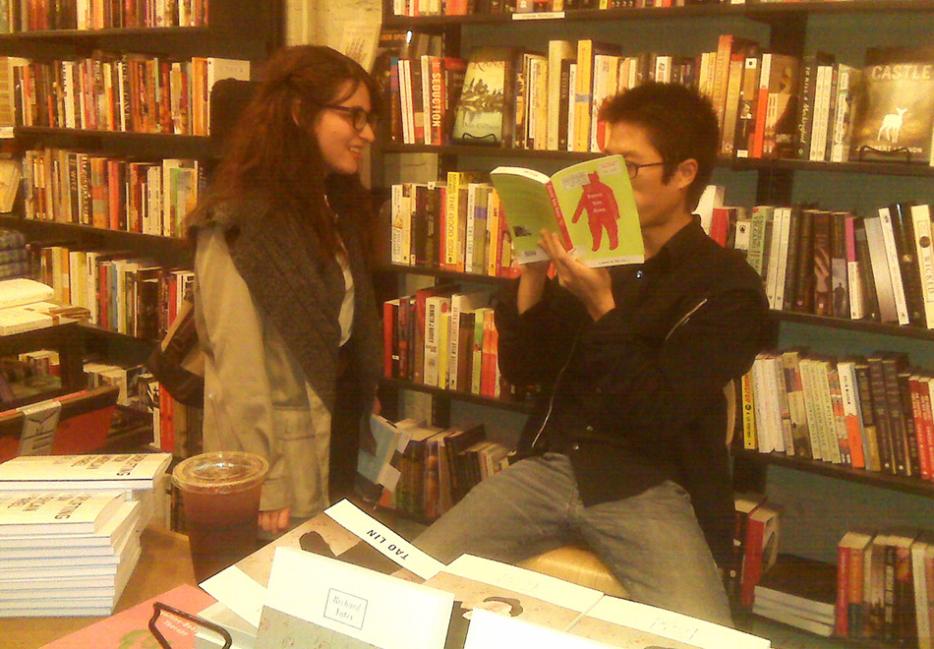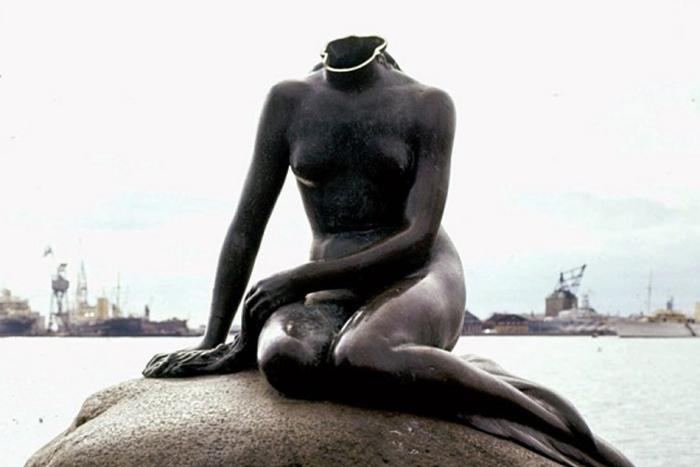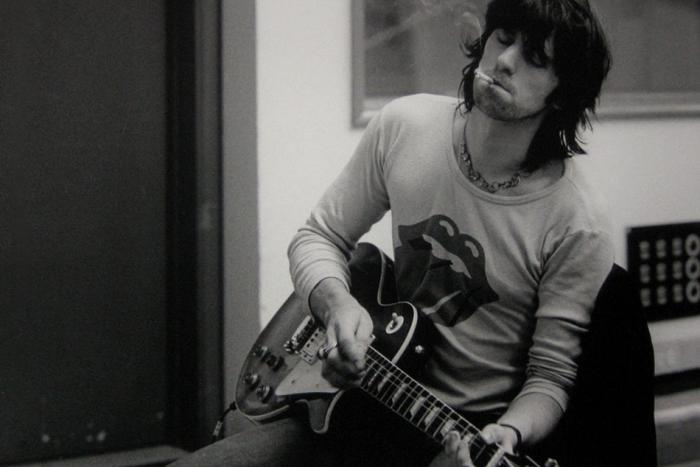About two months ago, I got an email from Tao Lin telling me that I was going to be featured in his new novel, Taipei. I had last spoken to him three years earlier, when I interviewed him for “2.5 IRL hours” after he ingested MDMA, for an article later published on Thought Catalog.
Our interview had been warm, antagonistic and fairly hilarious—while “molly” is currently the subject of a trend piece in the New York Times, it made Lin sink into a beanbag chair and gaze openly at me, while I stumbled nervously over questions like, “Do you think you are trying to say something about contemporary culture?” (Lin: “Definitely not.”) Lin, who has a flat monotone voice and an amazing gift for deadpan humor, can come off as really mean in an interview transcript, but he is quite sweet and benign and thoughtful in person. I felt warmly toward him and left the interview thinking that, in a minute way, my life had changed.
While our 2010 interview ran the gamut from literary ambitions to Lin’s jailed father to my necklace that looked like a Transformer, Lin maintained, “My goal in life is to find a girlfriend.” Later, he corrected himself: “My main goal is be able to have so much control over myself that I’m able to remain satisfied no matter what is happening out of me.”
Taipei, Lin’s third novel and seventh book, seems to exemplify that struggle. “Paul” (a literary stand-in for Lin) travels through North America on a book tour and visits his parents in China, falling in love with multiple girls, including a woman named “Erin” (based on the writer Megan Boyle) whom he marries in Las Vegas. The two take copious amounts of drugs and film guerilla documentaries on their iMacs for their self-distributed production company, MDMA Films. There is talk about how life offers fleeting images of beauty. But Paul’s excessive drug use, and determination to feel both everything and nothing whatsoever, is the frustrating crux of the book. The flattened emotions offer aesthetic and emotional distance from the characters; they’re Lin’s attempt to make the reader feel as deadened as possible. Toward the end, it feels as if the threat of real emotions are what keep our generation from growing up.
I show up around page 125, as a 22-year-old journalist named Alethia who is described as both “doe-like” (which was flattering) and an object of vague hatred for the protagonist (which made me wonder if Tao Lin thought I was a sociopath by extension of my profession). While I don’t want to talk too much about myself, I will say that Lin’s depiction of our encounter was fairly accurate.
Two weeks ago, Hazlitt asked me to interview Lin. I called him from their offices and tape-recorded our conversation on my iPhone while drinking a giant, gross smoothie from a chain across the street called “Liquid Nutrition.”
The interview was awkward, but in retrospect I’m not sure what I was so afraid of. Afterward we texted about how we should include footnotes.11I think I prefer this interview without footnotes (except this and another footnote). I don't want disrupt its flow with too many footnotes. I hope this is okay with everyone. Thank you for reading. —Tao Lin
to give context on the piece. “I like your transcription style,” texted Lin. “I’ll write footnotes about your footnotes,” I texted back. “Sweet. Another groundbreaking interview,” he texted. “Lol,” I replied.
Chandler Levack: I think they could be flexible about using footnotes.
Tao Lin: Oh okay… Good.
(Pause)
You said you “weren’t sure” if you liked the book? Or something like that?
Taipei? Um… I did like the book. It kind of reminded me of a genre of movies that I don’t like, which are “drug movies.”
Which one? Which drug movie?
Like, Requiem For A Dream, or Trainspotting…
It reminded you of that?
Yeah.
But it’s so much… to me, it’s completely different because I don’t like those drug movies either.
Really?
Yeah… Do you like any drug movies?
I don’t like any drug movies because I over identify with the main character that’s getting addicted to drugs. And I feel like when I’m watching them, I relate so much to the main character that it starts to feel like I’m addicted to drugs?
But that’s not… right.
And as their life kind of like, spirals out of control… I just feel like I’m losing my mind.
Oh. But in my book—he isn’t addicted or anything.
But in the sections where you and Erin are visiting—like should I say “Paul” and “Erin?” Would you prefer it if I used the character’s names?
Yeah, definitely. (Scoffs).
When they’re visiting his parent’s house in Taipei and the amount of drugs you’re using on a regular basis—it was hard for me—
You said “you!”
Oh, sorry… “him.” The amount of drugs that they’re using on a regular basis is so… disconcerting, I guess.
Huh. So there’s no—wait, what about other drug books? You like any of those?
I don’t know… What do you think are some really good drug books?
Like, do you like Jesus’ Son?
I haven’t read it. But I heard it’s really good.
Yeah, I like it. Everyone loves it, it seems.
Is Fear and Loathing in Las Vegas a drug book?
Yeah, yeah… Do you like that?
Yeah.
That’s way more drugs! That’s like, the most drugs.
Yeah, that is the most drugs. But there are a lot of drugs in your book too.
There’s not that many.
Is it exaggerated from the amount of drugs that you were doing at that time? Do you feel like the drug use is like, a “literary device?”
A “literary device?” No… no. Like I put, like what they ate and stuff also. But, no I don’t think that it’s exaggerated. But I feel like there are pages at a time where it doesn’t mention drugs at all.
How did you feel about that New York magazine profile that came out about you?
I liked it a lot. I thought it was really funny. But the comments are all negative.
I feel like it captured what it’s like to know you. It was very warm, you know? But it also felt like the reporter was sensationalizing it to make the experience sound way more “hard core” than it probably was.
Really? Well, I tried to downplay that at all times. For everything, regarding this book. But I feel like on the Internet, it seems like there’s way more negative comments everywhere. Do you feel that way?
Yeah, and I don’t understand it. Like in regards to your work, I don’t understand where the criticism is coming from.
I mean there are just negative comments everywhere!
Just in general?
Yeah, it seems…
Do you take negative comments seriously, like do they hurt your feelings?
No, but there’s a lot of them. Many people if they read a negative review they’ll just take the person’s word for it. I feel like they’re giving the critics or whoever is writing the article too much… um… power or something.
Yeah. Well it’s kind of interesting to see the response between your book and Marie Calloway’s book. Because it seems like—in her case, her book is praised as this like, “feminist discourse”…
Wait—what are you talking about?
I don’t know! I just feel like with Marie Calloway’s book, people are like, “oh she’s starting this feminist discourse about power and sexuality,” and she’s like willingly making herself into like, an object. But she’s still writing about her life and the things that have happened. And you’re doing the same thing. It feels like anytime anyone writes about themselves, the easiest thing to call you is narcissistic.
Me?
Just anyone.
Have you read many reviews of her book?
I read this one by Stephen Marche in Esquire that compared the two of you?
The guy was just like, doing it on purpose, I feel. Whatever he was doing. Did you read Sarah’s (Nicole Prickett) response to that thing?
Yeah, it was good.
What was good about it?
I don’t actually know what was good about it. It was well written but I don’t know what she actually said.
Yeah I couldn’t understand it. And then in the comment section there were two people who were like, “I’ve been reading too much science fiction.” They blamed themselves.
Did you meet Sarah?
Yeah, Sheila Heti’s going to post our transcript today, I think.
Oh wow. What was it like meeting her?
Well I feel like I just defended Marie the entire time. Mostly.
Oh, okay.
Oh well, I’m afraid to read the transcript—I’m not going to. But it’s going up today.22The transcript has not been published. —Tao Lin It’s 11,000 words I think.
I liked your book a lot… I had a real visceral reaction to it. But it was also weird to read something where I was a fictionalized character in it. And it made me wonder how much of it is fiction and how I come off as a person…
Uh, your instinct was just to call a character “me,” but I feel like I discourage that a lot.
I didn’t try to like, I didn’t care about what really happened. So there’s a lot of stuff in there that if you thought it was real you would not have an accurate view.
Is it a hard position to be in—where you write a novel that’s fictionalized, but you know every event that happens in the book is true?
What do you mean?
Like, you did marry a woman in Las Vegas and you did visit your parents in Taipei and you did live tweet using heroin in a movie theatre while you were watching X-Men… Like, all those things are real, but you’re putting it into this fictionalized context?
Well, it’s just fiction to me.
Because if I just wrote it down as non-fiction it would just be… It would be completely different because um, I feel like I’ve talked about this a lot. And to talk about it again… I just like, spend the entire time trying to think of what I thought before and then I mess it up.
It probably gets boring to have to explain it over and over again.
It’s not boring, it’s just like—I can’t do it. I was saying to myself I was just going to memorize my views on certain things but I haven’t been able to do that. And I feel weird just repeating myself. And like, in some interviews I just want to paste what I said in another interview but that just seems like “rude” or something…
And I guess you have to act like you’re hearing the question for the first time.
Yeah—that’s why I don’t say anything for a long time after hearing questions because I’m just thinking, “Jesus this is so annoying.”
Did you see Frances Ha?
No—did you?
Yeah, it’s really good.
Oh. I heard it has a happy ending that people don’t like. Did you like the happy ending?
Yeah, I liked the happy ending. Do you think your book has a happy ending?
No. Do you?
No, it’s actually really sad.
Well it’s just sad the entire time, I think. So the ending is just the same as the rest of the book.
Well it just seemed like the character in the book was just going along with different situations thinking that it would stop him from being lonely in a way.
That’s what it seemed like?
Yeah, it felt bittersweet that the marriage happened because it would be “funny,” or like a joke, or an ironic thing to do.
Yeah but you could tell the characters were close to each other.
(Long pause)
What reviews of this book have you read?
No, I mean I’m just talking about what I think—myself.
No, I know but I mean what reviews have you read?
Um… I mean I read the New York Times review?
Did you read the Millions review? That one had a lot of negative comments. What did you think about that review?
It seemed like she was trying not to admit that she liked the book.
Maybe. I didn’t get this part at the end, where she’s like, “it is my opinion that this novel’s awful and I am aesthetically or philosophically opposed to it.” I didn’t get why it was aesthetically ‘or’ philosophically. But it seemed like everyone agreed with it a lot. In the comments, like every person.
Do you think that your book is divisive…like people either like it or they hate it?
I think people just hate me.
Why?
Well, they think I promote myself too much, I guess. The Publisher’s Weekly news editor tweeted something… that I’d been running a “long con game for years.” That seems really bleak to me. Like, that’s the news editor for Publisher’s Weekly!
It seems like… well you’re a writer, so if you’re not going to promote yourself, who will? Like, what’s the “proper” way to be a writer?
Well, I don’t know. The thing is like—I never say that I’m good or anything. Ever. Like have any of your articles ever gotten like unanimous negative feedback?
I wrote this article about quitting Facebook a couple years ago. And it was called “Facebook Suicide.” And this one guy… like, he called me a “public masturbator.”
Oh Jesus, I’m looking it up. Is it on the Internet?
Um, the magazine that I wrote for doesn’t exist anymore.
Jesus—what happened to it?
Um, I don’t know. It just folded. [Note: EYE WEEKLY has been remade into The Grid.]
That seems shitty. But you’re glad it’s gone?
Uh, I guess so… All the negative comments made me feel like ashamed of ever writing it. But it seems like as many negative comments as you’ve gotten you’ve also gotten like, “high praise,” right?
Yeah? From where?
Uh… like the New York Times?
That one’s like, “I hate it and love it.” I like the Observer review the most. That one came out and just told people that they should stop calling me a “generational writer.” And it actually paid attention to what writers I like and stuff. I felt like “moved” after reading that one.
A lot of reviews have said that this is your best work to date, or your most accomplished book… But I’m wondering, you know, what are you accomplishing?
Well I think a lot of people don’t admire simple prose style. So automatically they’ll view a book with a larger vocabulary as better.
I don’t know if you’ve looked back on what our conversation was like, but it does feel like you’re highly observant about people. You have an acute sense of self-awareness.
You probably have the same amount.
I don’t think so—maybe.
I just probably thought really hard about certain things.
How did you choose to decide what you were going to write about?
It had to be like, people I was interested in. Like if someone was going to look bad—I wouldn’t put that in.
And I deleted a lot of parts for the character where he just wasn’t interesting to me anymore. Like, if I included someone it means I’m like, interested in them.
(Long pause)
Well, in the book you said, later you felt like your character and my character “hated” each other?
Yeah.
And I thought that was a really good line but it kind of took me by surprise. Because I felt like, I don’t know—somehow I had hurt your feelings. Or I guess I took everything in the book at like, face value, not thinking that it was a fictionalization of anything.
Mmm… I really like couldn’t remember it. Like a lot of the book, like I wouldn’t take it as what I felt at the time. It just seemed to work well there.
And it said that he was “half joking” or something. Like even if I didn’t even feel that, I would say it as a joke to a certain friend that I would know would get it.
Did you feel like, writing the book, that it had “helped you?” Did it help you find a perspective on some of the stuff that happened to you?
Um…
Did you cry when you wrote the book?
I’m sure I did at some points, not the entire time. Like in passages about death or something. But when I reread the book most recently, I felt like, really negatively towards the main character? So I’m glad that happened.
You’re glad that you didn’t like him?
Yeah. Because I think I’ll be like “nicer” now. In certain ways.
I really liked the parts where you talked about your parents… It seemed like that would be hard to write about.
Oh yeah. But you shouldn’t keep saying “you!” I don’t get that phrase—“thinly veiled auto—” what’s it called?
Autobiography?
Yeah! Because why would I want to like, do that? I mean if I wanted to like, hide something I would just make the characters completely different.
--






